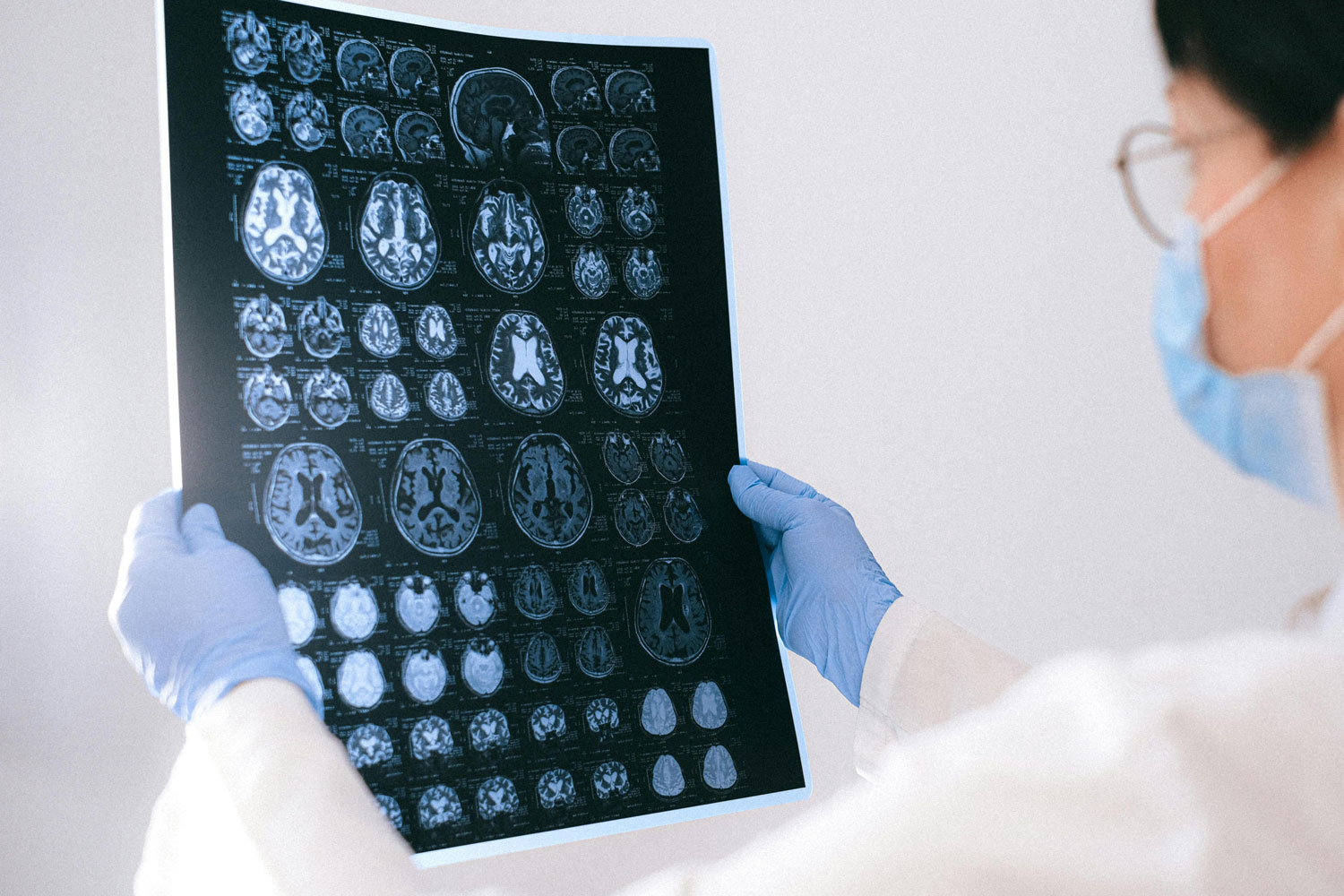Stress is an inevitable experience in modern life, characterized by emotional, physical, and psychological responses to demanding or threatening situations. In moderate doses, it is known that stress can be adaptive, enhancing focus and performance. However, chronic stress, particularly over prolonged periods, has been increasingly recognized for its detrimental effects on various physiological systems, including the brain [1]. Notably, stress has profound consequences on cognitive functions, especially memory, and may serve as a risk factor for neurological conditions such as Alzheimer’s disease (AD) and other forms of dementia [2]. This article aims to provide a basic introduction to the complex relationship between stress and memory, with a focus on how prolonged stress can increase the risk of Alzheimer’s disease.
The Basics: Physiological Mechanisms Behind Stress
Stress is primarily mediated by the hypothalamic-pituitary-adrenal (HPA) axis, a system of glands and hormones that regulate the body’s response to stress. When an individual perceives a stressful event, the interaction between the hypothalamus and the pituitary gland in the brain triggers the HPA axis, which results in the release of stress hormones, such as cortisol and adrenaline. These hormones prepare the body for a “fight or flight” response by increasing heart rate, dilating pupils, and releasing glucose for immediate energy [3]. While this response is adaptive for directing energy to the right organs in short-term stress scenarios, chronic activation of the HPA axis leads to sustained high levels of cortisol and other stress-related hormones in the bloodstream, which can have long-lasting negative effects on the body and brain.
What does stress have to do with my memory?
Memory is a complex cognitive process that involves encoding, storing, and retrieving information, engaging a network of brain regions, including the hippocampus, prefrontal cortex, amygdala, and other areas [4]. While the HPA-axis and the role of cortisol is only one explanation for the complex, interconnected hormonal cascades taking place during chronic stress, it has been a source of growing research linking stress with memory. Cortisol, the primary stress hormone, is a steroid hormone produced by the adrenal glands. In the short term, cortisol is involved in memory consolidation, particularly in the hippocampus, an area of the brain crucial for memory formation, storage, and retrieval [5]. However, prolonged or chronic elevation of cortisol can have the opposite effect, impairing hippocampal function. This disruption can lead to difficulties in memory formation, recall, and the development of cognitive decline over time.
Chronic stress has also been linked to structural changes in the brain, particularly in regions associated with memory, such as the hippocampus and the prefrontal cortex. The hippocampus, which is responsible for converting short-term memories into long-term ones, is particularly vulnerable to the effects of chronic cortisol exposure [6]. Studies have shown that high levels of cortisol can lead to hippocampal atrophy, a reduction in the size and function of this critical brain area, which directly correlates with deficits in memory and learning abilities.
Acute stress can have temporary effects on memory, often impairing the ability to recall specific details or to make decisions in the moment. Sometimes acute stress can even help with certain forms of memory. In healthy adults, negative effects on memory, however, tend to resolve once the stressor is removed and the body returns to its baseline state [5]. For example, a stressful situation, such as taking an important exam, may make it difficult for an individual to remember certain facts, but this memory impairment usually improves after the stress has passed.
In contrast, chronic stress can have much more profound and long-lasting effects on memory. Persistent high levels of cortisol can damage brain cells and interfere with the synaptic connections between neurons that are essential for memory storage and retrieval [7]. Over time, this damage can lead to significant memory impairment, including difficulties in forming new memories and recalling past experiences. Chronic stress has also been associated with the reduction in hippocampal volume mentioned earlier, which is often seen in individuals with Alzheimer’s disease.
Working memory, which involves temporarily holding and manipulating information, is particularly susceptible to stress. Research shows that acute stress can impair working memory by reducing the ability to focus and maintain attention, which are crucial for processing and recalling information [8]. Chronic stress further exacerbates these issues by reducing the efficiency of neural circuits in the prefrontal cortex, a brain region essential for higher-order cognitive functions such as problem-solving, decision-making, and working memory.
Long-term memory, which involves the storage of information over extended periods, is also affected by stress. Chronic stress can lead to difficulties in encoding new information and retrieving previously stored memories. This impairment can be subtle at first but may progress to more noticeable memory deficits as a result of the accumulative effects of stress.
Stress and the Risk of Alzheimer’s Disease
Alzheimer’s disease is a neurodegenerative disorder characterized by progressive memory loss, cognitive decline, and changes in behavior. It is the most common form of dementia, affecting millions of individuals worldwide, particularly in older adults. Alzheimer’s disease is marked by the accumulation of amyloid plaques and tau tangles in the brain, which disrupt normal neural function and contribute to memory and cognitive impairments [9]. Recent studies suggest that chronic stress may contribute to the development and progression of Alzheimer’s disease, acting as a risk factor that accelerates brain degeneration. The relationship between stress and Alzheimer’s disease is complex, but several mechanisms have been identified that may link the two.
As mentioned earlier, cortisol plays a significant role in the stress response, damaging cells in the hippocampus. This damage not only impairs the brain’s ability to form new memories, but may also make the brain more vulnerable to the pathological processes associated with Alzheimer’s disease, such as amyloid plaque formation. Some studies have suggested that individuals who experience prolonged stress, especially early in life, may have higher baseline levels of cortisol in adulthood, which could increase their risk of developing Alzheimer’s disease [10]. Chronic stress might also accelerate the accumulation of amyloid plaques and tau tangles in the brain, key features of Alzheimer’s disease. For example, research has shown that stress can promote inflammation and oxidative damage in the brain, which accelerate the progression of the disease.
In individuals who are genetically predisposed to Alzheimer’s disease, such as those with a family history or certain genetic markers (e.g., the APOE ε4 allele), chronic stress may be an even accelerate the onset of dementia by exacerbating hippocampal damage [11]. Not only may chronic stress heighten the likelihood for plaques to form in the first place, some evidence suggests that the damage caused by stress hormones like cortisol may make the brain more vulnerable to the toxic effects of amyloid-beta and tau proteins [12]. This interaction between stress-related brain damage and the development of Alzheimer’s disease is still an area of active research, and it highlights the importance of managing stress in order to protect brain health.
Psychological and Lifestyle Factors
It is important to note that the effects of stress on memory and Alzheimer’s disease risk are not solely biological. Psychological and lifestyle factors, such as social support, sleep, physical activity, and diet, also play a crucial role in modulating the impact of stress on cognitive health. There are several factors within our day-to-day lives that can be adjusted, even in small, gradual ways, to protect against stress’ negative implications for memory health.
Strong social networks have been shown to buffer the negative effects of stress. Individuals with supportive relationships are less likely to experience chronic stress, and they may be better equipped to cope with stressful events when they occur. Our social relationships provide us the emotional and material support to navigate stressful events in a healthier way. Social engagement may also promote cognitive reserve, a concept that refers to the brain’s ability to adapt and compensate for damage in the face of aging or injury [13].
Chronic stress often disrupts sleep, and poor sleep hygiene has been linked to memory impairments and an increased risk of Alzheimer’s disease. Sleep plays a critical role in memory consolidation, and insufficient or poor-quality sleep may exacerbate the cognitive deficits caused by stress [14]. Establishing a consistent sleep schedule, creating a relaxing bedtime routine, and ensuring a comfortable sleep environment can help mitigate the effects of stress on sleep. Additionally, mindfulness or relaxation techniques before bed can help calm the mind and promote better sleep.
Regular physical exercise and a healthy diet are important for maintaining cognitive function and mitigating the effects of stress on the brain. Physical activity has been shown to reduce cortisol levels, produce neuroprotective endorphins, enhance hippocampal function, and promote neuroplasticity, or the proliferation of new connections between neurons. Regular exercise even produces brain-derived neurotrophic factor (BDNF), a protein that supports the growth and survival of neurons. Aerobic exercises like walking, running, cycling, and swimming are particularly beneficial, as they improve cardiovascular health and increase blood flow to the brain [15]. Strength training and yoga can also be effective in reducing stress and improving cognitive function. Consuming a diet rich in antioxidants, such as berries, green leafy vegetables, and nuts, can help reduce inflammation and oxidative stress in the brain. Omega-3 fatty acids, found in fatty fish like salmon, flaxseeds, and walnuts, have been shown to support hippocampal function and memory [16].
Engaging in cognitive training activities, such as puzzles, reading, learning new skills, or playing memory-enhancing games, can help strengthen neural connections and maintain cognitive function. Mental stimulation helps create cognitive reserve, which may protect against the onset of Alzheimer’s disease and other forms of dementia in pre-clinical stages [17]. Additionally, continuing education or hobbies that challenge the brain can be particularly helpful in promoting lifelong cognitive health and overall psychological wellbeing. While these methods may be effective in the general protection of cognitive function with age, further research is needed to fully understand the complex relationship between stress and Alzheimer’s disease, and to develop targeted interventions that can mitigate the impact of stress on memory and cognitive decline.
Please read more of the scientific literature around stress and memory using our sources below:
-
https://www.apa.org/topics/stress/body#:~:text=Chronic%20stress%2C%20or%20a%20constant,%2C%20heart%20attack%2C%20or%20stroke.
-
https://pmc.ncbi.nlm.nih.gov/articles/PMC6405479/#:~:text=Results:%20Clinical%20studies%20found%20that,%2C%20neurotransmitters%2C%20and%20growth%20factors.
-
https://pmc.ncbi.nlm.nih.gov/articles/PMC4867107/
-
https://pmc.ncbi.nlm.nih.gov/articles/PMC10410470/
-
https://www.nature.com/articles/npjscilearn201611#:~:text=Cortisol%20reaches%20peak%20level%20concentrations%20~20%E2%80%9330%20min,the%20brain%20to%20affect%20cognition%20and%20behaviour.&text=This%20memory%20impairing%20effect%20of%20stress%20long,of%20information%20learned%20during%20the%20stressful%20encounter.
-
https://pmc.ncbi.nlm.nih.gov/articles/PMC4677120/
-
https://pmc.ncbi.nlm.nih.gov/articles/PMC5619133/
-
https://pmc.ncbi.nlm.nih.gov/articles/PMC2628592/
-
https://www.nia.nih.gov/health/alzheimers-and-dementia/alzheimers-disease-fact-sheet
-
https://www.sciencedirect.com/science/article/pii/S0753332220311872#:~:text=Chronic%20stress%20and%20high%20levels%20of%20glucocorticoids,in%20cognitive%20functions%20including%20learning%20and%20memory.&text=These%20extracellular%20plaques%20and%20intracellular%20tangles%20damage,hippocampus%20and%20cerebral%20cortex%2C%20leading%20to%20AD.
-
https://www.nia.nih.gov/health/alzheimers-causes-and-risk-factors/alzheimers-disease-genetics-fact-sheet
-
https://pmc.ncbi.nlm.nih.gov/articles/PMC2905685/
-
https://pmc.ncbi.nlm.nih.gov/articles/PMC6859943/#:~:text=The%20cognitive%20reserve%20model%20posits,Valenzuela%20and%20Sachdev%2C%202006).
-
https://pmc.ncbi.nlm.nih.gov/articles/PMC2656292/#:~:text=According%20to%20explanations%20on%20selective,%2C%20divergent%20thinking%2C%20and%20creativity.
-
https://www.mdpi.com/2218-273X/13/11/1577#:~:text=Brain%2Dderived%20neurotrophic%20factor%20(BDNF)%20is%20a%20key,cognitive%20disorders%20such%20as%20Alzheimer’s%20disease%20(AD).&text=FNDC5/Irisin%20Increases%20BDNF%20Levels%20in%20the%20Hippocampus%20and%20Supports%20Learning%20and%20Memory.
-
https://www.health.harvard.edu/healthbeat/foods-linked-to-better-brainpower
-
https://pmc.ncbi.nlm.nih.gov/articles/PMC4417099/







